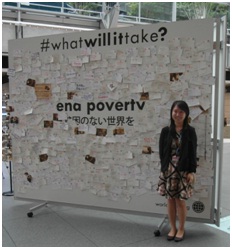By Foo Xian Yun (Year 4, Economics)
It was indeed an honour for me to have been selected by the International Monetary Fund (IMF) to represent Singapore as a sponsored Youth Fellow at the IMF World Bank Annual Meetings 2012 in Tokyo, Japan. My experience at the youth dialogue, meetings, plenary session, as well as interaction with youths, academics, civil society representatives and senior management of the IMF and World Bank was truly amazing. It was a once in a lifetime experience, and will become a memory that I will treasure deeply years down the road.
Including myself, there were altogether 11 IMF Youth Fellows. Seven of them were Japanese students who were finalists of an essay competition that was held in Japan. The other three students came from China, Korea and Thailand. There was some diversity amongst this group, and such diversity really allowed us to learn from one another – be it about economic issues or politics in each of our countries. I believe that one of my biggest takeaways from the meetings is the friendship that was forged between myself and the other Youth Fellows.
One of the highlights of the meetings for the Youth Fellows was the high-level Youth Dialogue titled “Asian Youths: Voicing Their Future” with the IMF Managing Director, Ms Nemat Shafik, and Nippon Television Corporation host, Ms Saki Yagi. The session was actually live webcasted via the IMF website and later televised on Japanese national TV! I personally posed two questions to Ms Shafik during the dialogue – relating to underemployment as education levels in societies increase, as well as how Asia can grow peacefully and cooperatively to foster greater economic growth as a region.
Aside from the Youth Dialogue, I also participated in more than ten different dialogue sessions and meetings. At a dialogue session with IMF Deputy Managing Director, Mr Naoyuki Shinohara, which included Asian Fellows from various civil society organisations, I was asked by Mr Shinohara to share about the ageing population in Singapore. As I also had the privilege of working at the Ministry of Trade and Industry earlier this year on a project relating to ageing and productivity, I further shared with the group some of the policies that Singapore have adopted to try to ameliorate the impact of ageing on productivity and economic growth.
Also, I had the extreme privilege of attending the Civil Society Organisation (CSO) Townhall session with IMF Managing Director, Ms Christine Lagarde and World Bank President, Mr Jim Yong Kim. I will never forget how it felt to be sitting at the same table as them! That aside, Ms Lagarde spoke about how the IMF is evolving to adapt to a changing global environment, while Mr Kim gave his full commitment to ending poverty – a message that he strongly believes in and has launched an entire campaign for. Last but not least, one of the final events I attended was the plenary session – the session that is attended by all governors, Ministers of Finance, CSO representatives and management officials of the IMF and World Bank.
The meetings allowed me to better understand the roles that the IMF and World Bank play in international development. I had rare opportunities to interact with senior officials of the IMF and World Bank, and for that I am truly thankful. However, I think my biggest takeaway from the meetings is not from the formal dialogues or sessions, but rather, the engagement that I had with people I met. The interaction with diverse peoples during the period of the meetings inspired me deeply. Many of the people I spoke to were leaders in development in their countries. They were people who were working to provide the most basic necessities to people in their country; people who were advocating education for women in countries that discriminated against females; people who were empowering youths by providing them with opportunities to learn and even start a business. These people were deeply engaged in their society and truly passionate about what they were doing. It was indeed an honour to have been able to speak to them and hear about their experiences.
I loved that these meetings were so international, allowing me to interact with people from countries I never thought I would meet. At a lunch session, I spoke to a Bangladeshi professor about women’s rights in Bangladesh. Before the CSO Townhall session started, I talked to a Nigerian CSO leader who shared with me his personal story of setting up his development organisation after he was released from jail, and how his son was entering law school. A female professor from Afghanistan told a group of us Youth Fellows that she enjoyed hearing our views during the Youth Dialogue and that she was delighted to meet us.
To conclude, these experiences are truly unforgettable to me. The personal relationships forged and stories shared are what I will remember years down the road. For this, I am truly thankful to NUS for nominating me as a representative, and for giving me this chance to learn from such a diverse group of people.







